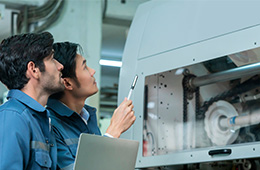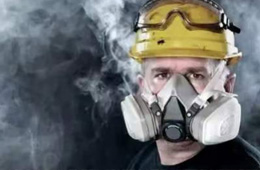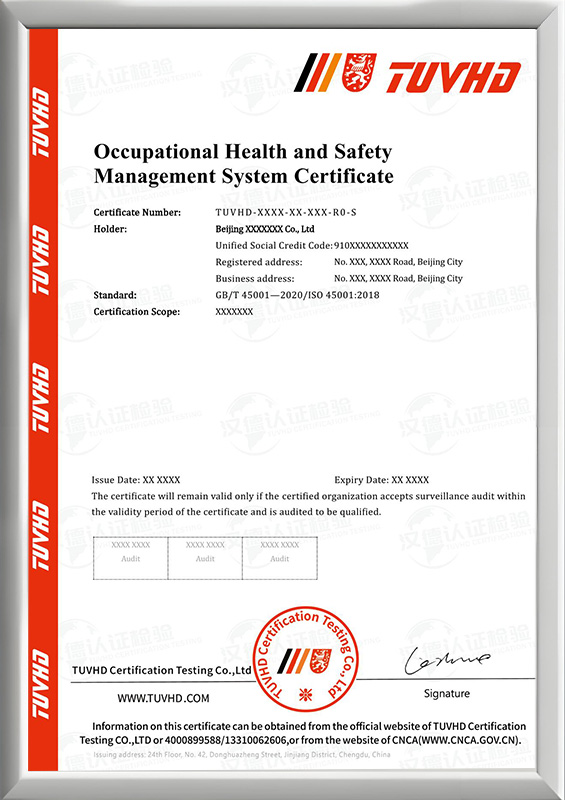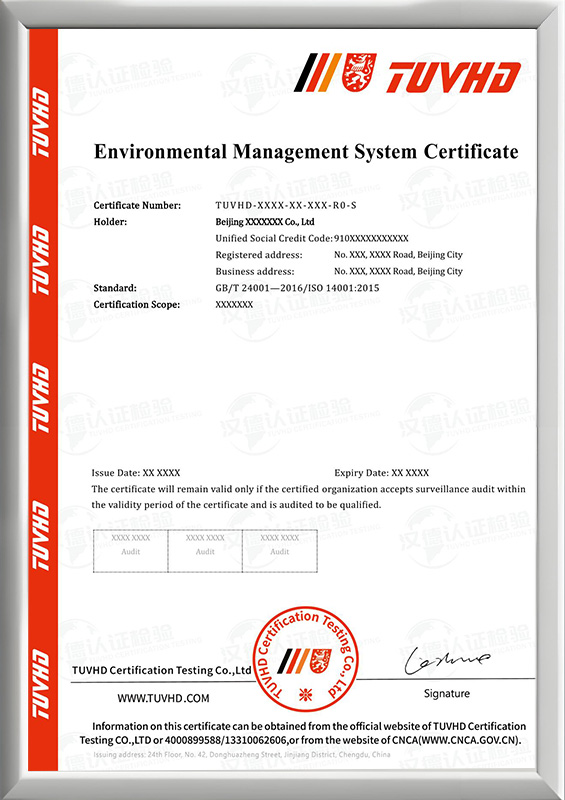TUVHD provides audit, certification, and training services for multiple fields, as well as product testing services
-
Management system certification(34)
- Sustainability Management System for Large scale Events > ISO20121
- Enterprise Integrity Management System > GB/T31950
- Business Continuity Management System > ISO22301
- Safety, Environment and Health Management System > HSE
- Enterprise Standardization Management System > GB/T15496
- Welding Quality Management System > ISO3834
- Evaluation of Green Supply Chain in Manufacturing Enterprises > GB/T39257
- Road Vehicle Functional Safety Management System > ISO26262ISO26262
- Road Vehicle Network Security Management System Certification > ISO/SAE21434
- Enterprise Site 6S Management Standard Certification > T/HNCAA001
-
Management system certification
- Artificial Intelligence Management System > ISO/IEC42001
- Data Security Capability Maturity Level Certification DSMM > GB/T37988
- Evaluation of Green Packaging System > GB/T37422
- ESG evaluation certification > ISO14064
- Enterprise Safety Production Standardization Certification > GB/T33000
- Green Supply Chain System Certification > GB/T33635
- oxic and Hazardous Substances in Electrical and Electronic Components > QC080000
- Compliance management systems > ISO37301
- Quality management systems(GJB 9001C) > GJB9001C
- Integrity management system of enterprise > GB/T31950
-
Management system certification
- Social Accountability management systems > SA8000
- Asset management systems > ISO55001
- Anti-bribery management systems > ISO37001
- Security management systems > ISO28000
- Road traffic safety (RTS) management systems > ISO39001
- Quality management systems > ISO9001
- Aerospace quality management systems > AS9100
- Medical devices quality management systems > ISO 13485
- Construction quality management systems > GB/T 50430
- Environmental management systems > ISO14001
-
TUVHD news
- TUVHD was awarded the title of "Three Outstanding Certification Institutions" in Sichuan Province for 2023 > TUVHD Certification and Inspection Co., Ltd. was awarded the title of "Three Outstanding Certification Institutions" in Sichuan Province in 2023. The enterprise case of "Improving Quality Management in the Six Dimensions and Ensuring Livelihood Water Use" was selected as one of the "Top 10 Excellent Practice Cases in the Province".
- [Dazhou Xuanhan County] Certification Assistance and Relief | Assistance for High Quality Development of Small and Medium Enterprises Training Meeting Successfully Convened >
- The special training meeting on improving the quality management system certification in Dachuan District, Dazhou was successfully held >
- TUVHD settled in Meishan City Quality Infrastructure One Stop Service Center >
- The Meishan City Park Enterprise Quality Management System Certification Improvement and High end Quality Certification Promotion Training Meeting was successfully held >
-
Industry news
- TUVHD invited to participate in the 2024 Chengdu "WORLD ACCREDITATION DAY" themed event >
- Xi jinping visiting members of the agricultural, social welfare, and social security sectors attending the CPPCC meeting >
-
Certified News
- TUVHD Certification has issued the Data Security Capability Maturity Model (DSMM) certification to Guangxi Information Industry >
- TUVHD Certification conducts DSMM3 level certification audit on UFIDA government affairs to help data security reach a new level! >
- TUVHD Goes to Yunnan Telecom Public Information Industry Co., Ltd. for DSMM Certification Review >
-
Announcement Notice
- What is authentication? What is recognition? >
- Notice on Some Companies Counterfeiting Our Company's Name to Undertake Certification Business, Falsifying Our Company's Seal and Certification Certificate to Collect Certification Fees >
-
Certified Encyclopedia
- What is service authentication? Q&A on Basic Knowledge of Service Certification 【 What Service Certification does Hande Certification provide? 】 > Service certification is a third-party certification provided by a service provider using qualification assessment techniques to determine whether their services and operations meet relevant standard requirements.
- What is authentication? What is recognition? >
-
Certification services
- Why choose TUVHD certification? > TUVHD provides precise and efficient certification services based on professional strength and rich experience. Deeply understand the standards, tailor solutions based on customer needs. Strengthen communication and collaboration, ensure smooth certification process, and assist customers in achieving greater value. Choose us, that is, choose the guarantee of quality and efficiency, and jointly promote the standardized development of the industry.
- TUVHD certification process >
- Certificate sample >
-
Training for auditors
- AS9100D: 2016 Advanced Training Course for Internal Auditors of Quality Management Systems for Aviation, Aerospace and Defense Organizations > AS9100 is an aerospace standard developed on the basis of ISO9001 quality system requirements, which includes annex requirements related to quality systems established by the aerospace industry to meet the quality requirements of regulatory agencies such as the Department of Defense (DOD), NASA, and FAA. This standard aims to establish a unified quality management system requirement for the aerospace industry, and implementing international aerospace quality management system standards and obtaining third-party certification is one of the prerequisites for market access. How to effectively build the AS9100D system and how to deeply apply process methods for standard review has become a new issue for middle and senior management and quality management personnel in enterprises. This training class will adopt a three-day centralized learning mode, with guided technology as the main training method, and use a process pyramid thinking model to construct the learning trajectory of the students. Quickly and comprehensively enhance the training personnel's ability to apply and review the new version of the standard in practical situations.
- GJB9001C: 2017 Advanced Training Course for Internal Auditors of Weapon and Equipment Quality Management System >
- ISO50001:2018 Energy Management System Internal Auditor Training Course >
-
Vocational training
- Dual Carbon Strategy Leading the Future - Seminar on Enterprise Energy Management System > Against the backdrop of accelerated global energy transition and widespread consensus on green development, improving energy management has become the key to reducing costs, increasing efficiency, and enhancing competitiveness for enterprises. The People's Government of Sichuan Province has issued the "Comprehensive Work Plan for Energy Conservation and Emission Reduction during the 14th Five Year Plan Period", aiming to promote energy conservation and emission reduction, pollution prevention and control in enterprises, efficient utilization of resources, accelerate the construction of a green, low-carbon and circular economic system, promote the comprehensive green transformation of economic and social development, and help achieve carbon peak and carbon neutrality goals. To this end, Hande Certification Inspection Co., Ltd. is holding a seminar on "Dual Carbon Strategy Leading the Future - Enterprise Energy Management System". The conference focuses on themes such as "peak carbon emissions", "carbon neutrality", and "energy management", exploring new trends and strategies in industry development, helping enterprises establish and enhance their development concepts of energy conservation and emission reduction, and thus stand out in the low-carbon and environmentally friendly market environment, bravely standing at the forefront of economic development.
- ESD Management System Certification Training >
- Improving Quality Management in Small and Micro Enterprises through Public Welfare Training >















